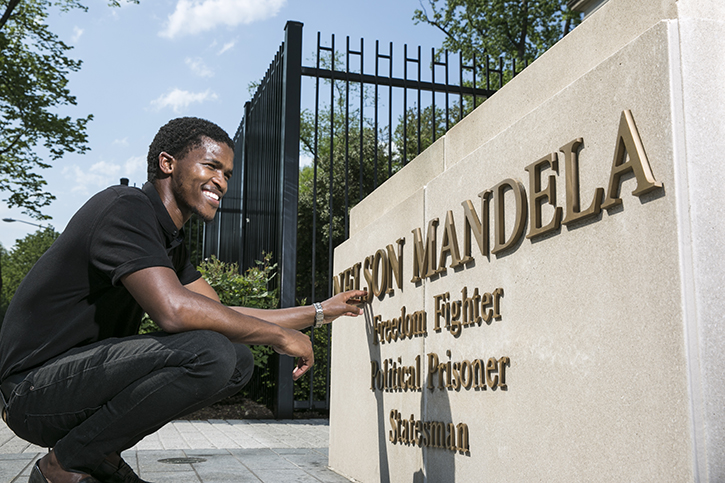
Siyabulela Mandela, grandson of Nelson Mandela, said his grandfather's legacy drew him to the field of conflict resolution. "I want to experience an Africa that is at peace with itself," he said. Photo by Ron Aira.
For Siyabulela Mandela, Mason’s School for Conflict Analysis and Resolution was the only place he felt he could continue the legacy of his late grandfather, Nelson Mandela, fighting for freedom and justice.
“As far as my profession is concerned, George Mason is known as one of the leading universities in peace research,” said Siyabulela Mandela, who mentioned S-CAR scholars John Burton, Christopher Mitchell, and Dennis Sandole as influences.
“Even my perspectives in conflict resolution have been shaped by scholars from S-CAR. That’s how I ended up here. There was no other place.”
Mandela, 25, arrived at Mason in April on his first trip to the United States as a visiting scholar. He will spend four months at Mason working on his PhD dissertation, “Preventative Diplomacy and Conflict Prevention in Africa.”
His research, he said, is influenced by Mason professors he studied as an undergraduate at Nelson Mandela University at Port Elizabeth in his province of Eastern Cape, South Africa, where he is on the faculty as a lecturer of peace studies.
“I am trying to find innovative ways of resolving conflict in Africa, a continent characterized by chronic conflicts and underdevelopment, because from what I have experienced and what I have seen, interventions [by nongovernment organizations] such as United Nations and African Union do not prove to be effective. The conflicts continue unabated and defy the means to resolve them.
“What I seek to understand is why these conflicts continue irrespective of all sorts of forms of trying to solve them. And I have reached a conclusion, which I am here to work deeper on: The conflicts continue because most conflicts in Africa revolve around issues of basic human needs.”
Mandela said it was the legacy of his grandfather that drew him to the field of conflict resolution.
“I want to experience an Africa that is at peace with itself,” he said.
